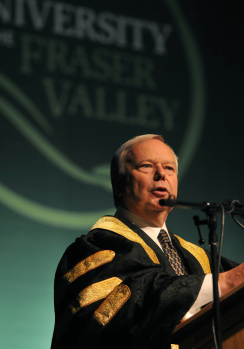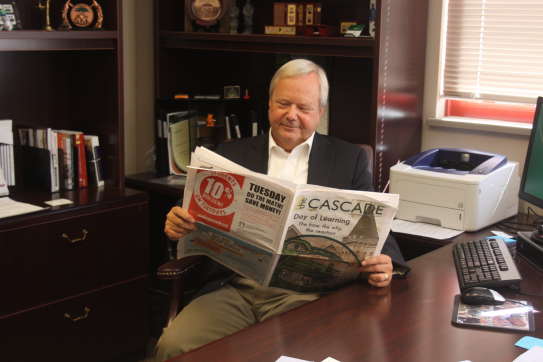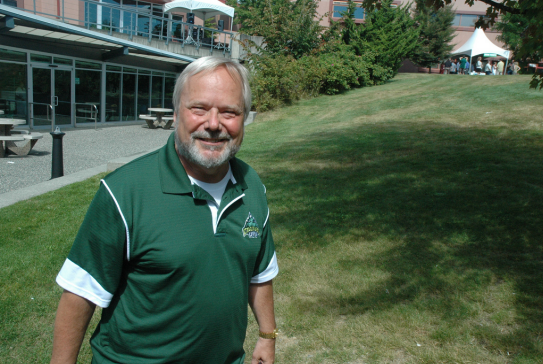By Joe Johnson (The Cascade) – Email
Print Edition: January 8, 2014
UFV’s formerly-bearded president, Mark Evered (he prefers to be simply called Mark), is about to see his tenure at our university extended. Evered has presided over a very eventful four years in UFV history and will now continue to do so until at least June 30, 2017. Mark recently sat down for an hour-long discussion about his life at UFV.
What can you tell me about your background?
I started life as a biologist. I did a four-year degree at McMaster University in biology and then three years later I completed a PhD in physiology, specializing in neuroscience. Then [I] went off to Cambridge for a couple of years on a Canadian Medical Research Council fellowship to spend two years working in a laboratory in Cambridge. And then began the teaching part of my academic career.
How do the experiences compare between teaching and administrating?
I certainly didn’t start my career aspiring to be a university president, or even a head of a department, at any time. As opportunities came along to be the head of a department, to take on various committees and councils, and subsequently more senior administrative positions, I guess I was intrigued by the challenges that those jobs brought.
I continue to miss the research work and the teaching very much. I had some successes there, and it was work that I enjoyed a lot, but as my career progressed I saw opportunities to also work even more with people.
I think that the unfortunate thing is that the nature of jobs like I have now are very demanding. They often require my attention seven days a week. There will often be events on weekends and evenings that I’m expected to attend, or I believe it’s important for me to attend, on behalf of the university. The days are full, the hours are long, and that unfortunately doesn’t leave time to give the attention to a class or research work that I would like. So you have to make choices. I still carry a few ideas for some research projects around with me that at the end of my term as president, I would like to explore once again — to take the opportunity to return.
When did you come to UFV, and how did you get here?
I came to UFV in 2009.
I was the vice-president academic and provost at Thompson Rivers University, and was not planning to move or to take on a presidency. But the search firm that was working on behalf of UFV invited me to apply — to allow my name to stand as a candidate.
And as I went through a very lengthy interview process — as it should be for a president — and as part of that process [learned] more and more about UFV, I became more and more attracted to the position and I was delighted when I got the call to say that I was being offered the job. And at that point it was a very easy decision.
What’s a day in the life of a UFV president?
Well, highly variable.
It’s not a job that, in any sense, could be called boring. It’s not uncommon that I would start with a breakfast meeting off-campus somewhere. There will be meetings with perhaps my executive team, with members of the Student Union Society, with a faculty council, with any number of committees or structures, or perhaps someone has a concern that they want to bring to me and we’ll schedule that in.
There’s an atmosphere of commitment and support, an atmosphere of caring — caring for the students, caring for each other, caring about our future, caring about getting it right, that just permeates this place.
It’s pretty rare that I get a chance to pop home for lunch. Surprising when I live right on campus. The afternoons are much like the mornings; they’re often full of meetings. There’s a lot of paperwork in this job. There are a lot of things that come to the president for a final signature.
And often in the evenings, if I’m not sitting and finally getting down to my email, [I’m] still doing my homework. I started university in 1968 and I reflect on the fact that I haven’t left the post-secondary system 45 years later, and I still seem to have a lot of homework. But often the evenings are full with some community function or some university function. Perhaps we’re entertaining. As you know we use my house on campus for entertaining, sometimes visitors from overseas, or functions we hold in the community. We sometimes use it to celebrate the successes of faculty or staff or students on campus. So the days are full.
What do you like to do when you have a couple of days to relax?
I must admit it’s quite frequently the case that when I get a bit of a break I’m quite exhausted and I’m very happy to put my feet up and perhaps get a beer out of the fridge and do some reading or watch a little bit of television. I don’t get a lot of time for that. The days are full so it’s very hard to schedule in anything regularly.
I have committed to doing more walking than I have in the past. We live in a beautiful area here. I have a bicycle that I don’t use often enough, that I need to use… to take the opportunity to get out and move around a bit; to try to compensate for the long hours sitting in a chair and sitting in close quarters.
Now another part of my life that I try to squeeze in whenever I can is time with my children and grandchildren. I have three daughters all married. Now I have six grandchildren. Unfortunately our children and grandchildren are in Saskatoon … so it’s not as much time for family as I’d like, although, we do take advantage of the electronics to stay in touch.
Do you have any positions or responsibilities outside of UFV?
I do sit on several committees and boards.
I’m the chair of the British Columbia Association of Institutes and Universities – which is the organization we created for the five new universities plus BCIT, the Justice Institute, and Nicola Valley Institute of Technology.
I’m on the economic advisory committee for the City of Abbotsford and the Abbotsford mayors’ taskforce on economic development. I’ve sat on committees for Mission, I’ve sat on committees for Chilliwack, and other parts of our region. We’re a member of the Association of Universities and Colleges of Canada. That’s about 100 universities in this country; all of the major universities in this country are members of the AUCC.
The role of president at universities over the last decade or so has evolved. Presidents at one time were the Chief Operating Officer of the university. But increasingly the president’s time is spent external to the university because of the need for someone to address the challenges of government relations, community relations, and the big one of course is building friendships and seeking financial support — not just from government, but from donors.
 What are some of the rewards of doing all this as president?
What are some of the rewards of doing all this as president?
It’s extremely rewarding. I love what I do.
That’s got a lot to do with the fact that I love this place and I love the people I work with. I consider myself very fortunate. I speak with presidents of other Canadian universities who aren’t in such a situation and I see the difficulties they face with challenges I don’t have to worry about.
We have our challenges that we face together — financial challenges, challenges that are related to regulations imposed on us that restrict us from doing some of the imaginative things we might like to do.
There are areas of concern, and I’m well aware of that, and I’m as frustrated sometimes as I’m sure some faculty or staff members are that we can’t do things that we’d really like to be able to do.
The rewards are the achievements that we can all be proud of. As I say to people, you don’t want to graduate from a university that’s not held in high regard — you definitely don’t want to get a degree or a diploma or a certificate from a university that no longer exists because they’ve collapsed; it failed. So in a sense we really are in this together for a lifetime. Once you’ve received a credential from this place the reputation of the institution is important to you.
We also have good collegial relations, not with just faculty and staff, but also with student — the students who have been serving on Senate and the Board and other committees I’m working on. That’s one of the joys of the job, to watch young people develop and watch students recognize and take some responsibility for the future of the university by stepping in and helping us manage the institution and set the future.
I guess it can be tiring as well?
It is tiring. It is important… if I were giving advice to others, as I try to do to my vice-presidents and faculty and staff, we urge people to take care of themselves as well because you can’t do these jobs if you don’t take care of yourself. I’m probably better at dispensing that advice than taking it myself.
I certainly wouldn’t want to be doing this job at 70 years old. For the record, I’m 63.
You live in Friesen house near the gym. What’s it like living on campus — any stories you’d care to share?
I love living on campus.
The proximity to the student residence, I would say, is one of the things I appreciate. You might think otherwise. They’re our neighbours. So for example when we have events at our house… there are usually leftovers, which we know there are always hungry neighbours next door happy to help us out with that.
There’s a little gazebo between my house and the residence and I’ve had some good conversations with people there as I’m walking home from work. My commute between this office and my house should be no more than five minutes, and as my long-suffering wife Maureen has experienced situations where I’ve said, “I’m leaving the office now, I’ll be home in five minutes” and it’s taken me an hour because I got engaged with some really interesting conversations with people who are doing interesting things.
Living on campus is an interesting experience. We have lots of windows in the house so we learned very early on it’s important to be properly dressed, to be prepared. You’re never too sure who’s going to walk past a window or be out there in the yard when you dash out to put some garbage out. You think, “Well, I could just pop out, nobody’s going to see me” and there could very well be somebody out there with a camera taking a picture of part of the garden, perhaps, but catching you when you’d rather not be photographed.
And I guess with AfterMath open ‘til 10 on Thursday nights, it can get kind of loud?
For the most part they’re happy sounds, they’re good sounds. I come from a family of five boys; it was a very noisy household. I learned to study in a very noisy household. But you’re right; it can get a little noisy. We haven’t actually had a problem. Occasionally when AfterMath closes people will have parked in one of the parking lots and decided to squeal the tires as they take off, or do doughnuts in the parking lot.
I do remember hearing, one evening, a loud bang as if someone had run into something, and quickly checked to see if everything was all right. It was some poor fellow in the parking lot with a buddy — perhaps they had had a couple of drinks — let’s leave it at that. The fellow had inadvertently put the car into reverse instead of drive and hit the accelerator and the car very quickly reversed into one of those cement blocks supporting the posts out there. So there he was in the parking lot, his car had hit this post square on and his bumper was wrapped around the cement block. But they were fine. An important lesson learned.
Any words on what new students can expect?
Coincidentally we’ve got some new programs. We’ve got a new bachelor of arts in global development studies … The Minister of Advanced Education has approved our major in economics within the BA program … We are extending our teacher education program to secondary education training, and that will start I think this summer.
Of course we’ve the got the development of the BC Centre Excellence in Agriculture. The construction is underway for the plant and animal teaching laboratories, and service laboratories – essentially a barn and a greenhouse going up as well as further developments there.
We’re looking forward to opening up the five corners campus in Chilliwack, the downtown campus, which we’re expecting the renovations to be completed … for a January start, for some Continuing Education programs.
Our sport teams have started out well this year. So we’re looking for some exciting times there. I would encourage students to take advantage of the home games. Whether it’s on soccer fields in Chilliwack or basketball or volleyball courts here. We’ve got a good rowing team and people would be welcomed, I know, to go out early to Fort Langley early in the morning and watch the rowing team get on the water. We’ve got both men’s and women’s golf teams, a new development of a women’s golf team which in the Pacific Western division, essentially the BC division, is already in front leading the pack — both men’s and women’s teams.
What makes UFV what it is? What’s special about this place?
There’s an atmosphere of commitment and support, an atmosphere of caring — caring for the students, caring for each other, caring about our future, caring about getting it right, that just permeates this place.
Clearly we have troubles. I don’t want to be a Pollyanna about this and pretend we don’t have challenges. I mean, my days would be a lot less full if we didn’t have challenges. But for the most part it’s a remarkable community of people.
You know, we very often point to our small classes. And we very often point to certain achievements of our students and our faculty and our staff. We point to the commitment of instructors. We hope we can continue to point to good facilities. But it really is the people because [otherwise] none of that would matter. You could have small classes and it would be a dismal failure if the people who were running those small classes didn’t care, didn’t care about getting to know people’s names.
We’re a first-name campus. Nobody calls me Dr. Evered or President Evered except maybe from another institution. I’m Mark. And likewise, so do I feel comfortable calling others by their first name. I guess it suits my personality.
[We have] this commitment to working together with care, with compassion, with mutual respect, and an understanding that times are tough and they may get tougher, but we’ve got a history of succeeding. We’ve got a history of change.This interview has been edited for length and clarity.





